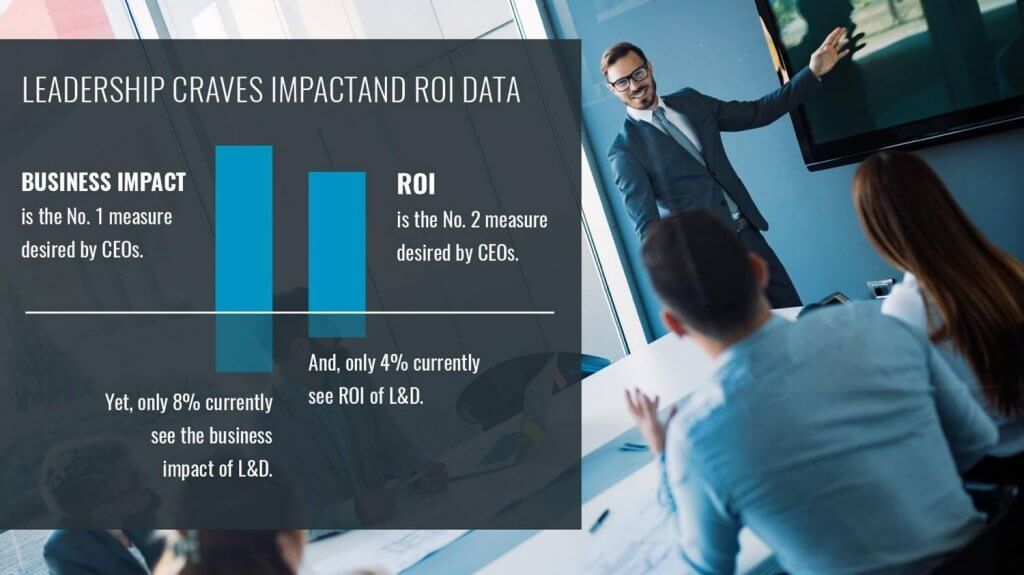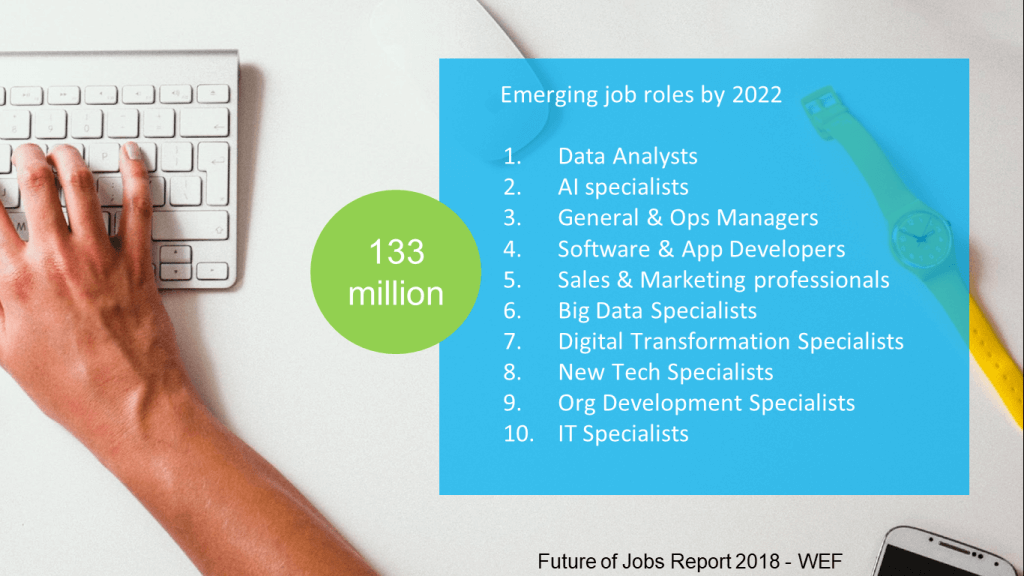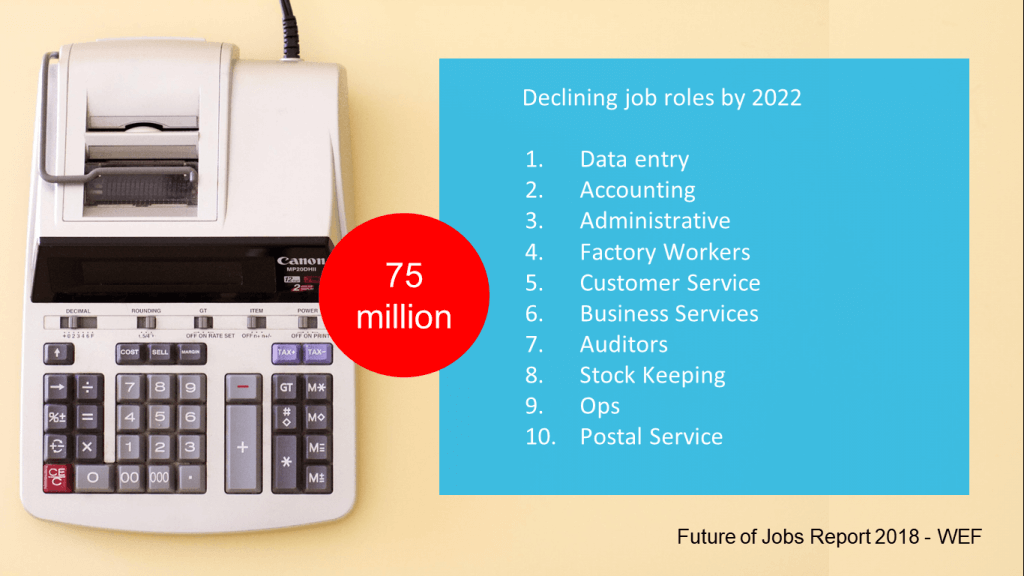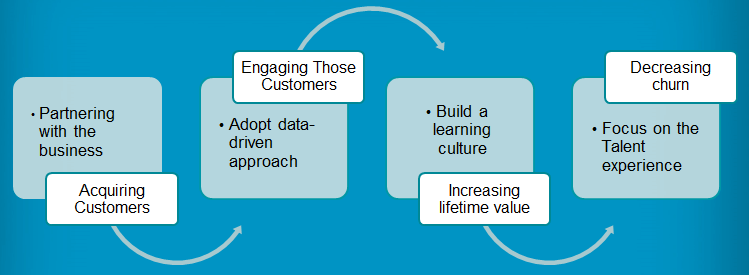Share
“The secret to success is to be ready when your opportunity comes”
For some time now, L&D has struggled for recognition within the ecosystem of an organisation, often struggling to find a seat at the boardroom table. Shackled by the belief that a classroom training session was just an excuse for a day out of the office and restricted by the monotony of click-next compliance training. Whilst CEOs crave the holy grail of demonstrable business impact and return on investment, L&D has laboured under the weight of out-dated models such as Kirkpatrick, that are no-longer fit for purpose in today’s data-driven world.

The good news however is that change is on the horizon, the changing demands of the workforce, coupled with advances in technology, mean there is now a real opportunity for L&D to elevate its position to that of the most critical internal business partner. This article will explore the opportunity that exists and how L&D must adopt a different approach to be successful and thrive.
Changing workforce
The world of work is changing – digital transformation is having a profound effect on our working (and consumer) lives. Uber is 9 years old and already testing self-driving cars, Airbnb has revolutionised the hotel industry. We are living through the era of the tech start-up, as new companies strive to automate and enhance our lives through the adoption of new technology. It is logical therefore that as technology advances and business adapts, the skills required by the workforce will change. Some analysts have name this “The 4th Industrial Revolution”.
A major study by the World Economic Forum (WEF) in 2018 started to analyse the rate of change over the next 4 years, reviewing the changing jobs and skills landscape – all of which should prove particular encouraging reading for L&D professionals.
If you thought the future workplace would be dominated by Robots and AI, then you would be right. If you thought the net result from this rise in automation would be a decline in jobs, then you might need to think again. According to the results from the WEF research, by 2022 there will be a net gain of approximately 50 million jobs globally.
As one might imagine, emerging job roles (of which there will be 133 million!) include positions such as Data Analysts, AI Specialists and New Tech Specialists. Interestingly however, this changing workforce dynamic will necessitate a need for roles such as Digital Transformation Specialists and Organisational Development Specialists. This author is also relieved to see the continued requirement for Commercial Professionals! 😉

Conversely if we look at declining roles then, as we might expect we see a decline in roles where tech can take over. Already we are seeing automisation in logistics and factory workers and with further tech advances we will see a reduced need for administrative and accounting roles where AI rules can be applied.

Herein lies the opportunity for L&D, in that the changing workplace landscape will require a changing set of skills for the workforce. Interestingly it is not just job roles that will lead to this new skillset requirement but also a fundamental change in the structure and culture of the organisations we work in. Many analysts are predicting a movement away from the top-down, management-led, heirarcichal organisation to autocratic organisations, self-governed by cross-functional teams. Leading to a growth in demand for skills such as critical thinking, creativity and analytical thinking. For more information on this study, I recommend you visit the WEF web pages.
The net result of these changes will be an increased focusing on retaining and retraining internal talent. Changing skills requirements are leading to increasing skills gaps in organisations and the rate of change within business means there is a decreasing shell life of knowledge. By demonstrating measurable business impact L&D can become a trusted and critical internal business partner, delivering better results by working in tandem with cross-functional teams. Let’s look at how we can adapt to move towards becoming a more trusted business partner by learning from IT and Marketing:
Think Like IT
Many of the UK readers will recognise the hit Ch4 commedy, The IT Crowd. A team of geeks, entrenched in the cellar of the building monitoring servers and knowing little about the strategic objectives of the organisation. However the reality in modern organisations is far from this fictional truth. As the rate of digital transformation has increased, the role of IT has changed from that of internal service provider to external solutions provider, as organisations add a digital layer to their offerings. This change has led to a fundamental shift in the way IT thinks and L&D can learn from this culture change.
The first is to get to know the pain points of your internal customers. For example if you are talking to the Sales Director about a product roll-out for a resource stretched, time sensitive sales force. Then rather creating a generic, one-size-fits all course, look to assess knowledge gaps and deliver individual, personalised learning interventions.
The second critical area is to stop speaking about learning and talk the common language of the business. There is a growing voice in our sector, championing the cause for a shift towards talking about performance and talent development and less about learning. CEOs don’t care about outdated learning models but want to know how quickly you can positively address a business issue and what the return on investment will be.
Adopt a marketing-led, data-driven approach
Ask a corporate audience which is the most important department in an organisation and many will respond with marketing. The fundamental change in terms of the elevation of marketing was due primarily to the shift towards a data-driven approach. All of sudden marketing was able to deliver personalised campaigns that have increased the lifetime value of a customer to a particular brand and decreased customer churn. In many respects L&D can learn a lot from this shift in approach…

If we look at the similarities, then the new marketing mix has many close correlations with the changing L&D world we are looking to embrace.
- L&D must partner with the business to identify pain points, from which we can design and deliver targeted learning campaigns
- To do so we must adopt a data-driven approach to learning. Knowing how, when and and where to deliver learning
- At the recent LPI LearningLive 2019 event. Heads of L&D voted “establishing a learning culture” as the most critical challenge facing them in the business. How can we embrace the changing workforce requirements and ensure we are continually delivering to our internal audiences, vs one-off campaigns
- Lastly the biggest issue facing HR moving forward will be to focus on retaining and retraining talent, in the same way the marketing seek to reduce consumer churn. In my opinion the correlation between the Talent and Learning Experience is going to be a huge development area in 2020 and beyond and we are already seeing mergers, acquisition and growth in this vendor area – definitely a case of watch this space.
Summary
We are now moving towards an era that will fundamentally shape the future of L&D. The opportunity exists to elevate and establish the fundamental importance of the function within the business. However this opportunity will (in some cases) require a change in mind-set, to start thinking about about the changing skills requirements of the workforce and how we deliver skills transition and acquisition programs that are aligned to the actual needs of the business.
Whilst there is no such thing as a job for life anymore, the WEF does predict that employees will need on average 101 days of training between now and 2022. So there might just be a job in L&D for the next three years or so!
Original source: Mike Byrne.
Share

